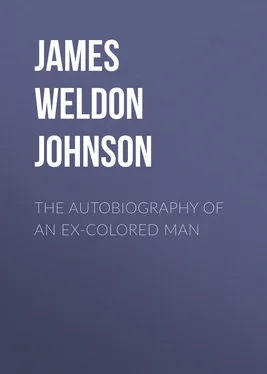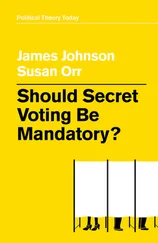James Weldon Johnson - The Autobiography of an Ex-Colored Man
Здесь есть возможность читать онлайн «James Weldon Johnson - The Autobiography of an Ex-Colored Man» — ознакомительный отрывок электронной книги совершенно бесплатно, а после прочтения отрывка купить полную версию. В некоторых случаях можно слушать аудио, скачать через торрент в формате fb2 и присутствует краткое содержание. Жанр: foreign_prose, foreign_antique, на английском языке. Описание произведения, (предисловие) а так же отзывы посетителей доступны на портале библиотеки ЛибКат.
- Название:The Autobiography of an Ex-Colored Man
- Автор:
- Жанр:
- Год:неизвестен
- ISBN:нет данных
- Рейтинг книги:3 / 5. Голосов: 1
-
Избранное:Добавить в избранное
- Отзывы:
-
Ваша оценка:
- 60
- 1
- 2
- 3
- 4
- 5
The Autobiography of an Ex-Colored Man: краткое содержание, описание и аннотация
Предлагаем к чтению аннотацию, описание, краткое содержание или предисловие (зависит от того, что написал сам автор книги «The Autobiography of an Ex-Colored Man»). Если вы не нашли необходимую информацию о книге — напишите в комментариях, мы постараемся отыскать её.
The Autobiography of an Ex-Colored Man — читать онлайн ознакомительный отрывок
Ниже представлен текст книги, разбитый по страницам. Система сохранения места последней прочитанной страницы, позволяет с удобством читать онлайн бесплатно книгу «The Autobiography of an Ex-Colored Man», без необходимости каждый раз заново искать на чём Вы остановились. Поставьте закладку, и сможете в любой момент перейти на страницу, на которой закончили чтение.
Интервал:
Закладка:
"Father, father," that was the word which had been to me a source of doubt and perplexity ever since the interview with my mother on the subject. How often I had wondered about my father, who he was, what he was like, whether alive or dead, and, above all, why she would not tell me about him. More than once I had been on the point of recalling to her the promise she had made me, but I instinctively felt that she was happier for not telling me and that I was happier for not being told; yet I had not the slightest idea what the real truth was. And here he stood before me, just the kind of looking father I had wishfully pictured him to be; but I made no advance toward him; I stood there feeling embarrassed and foolish, not knowing what to say or do. I am not sure but that he felt pretty much the same. My mother stood at my side with one hand on my shoulder, almost pushing me forward, but I did not move. I can well remember the look of disappointment, even pain, on her face; and I can now understand that she could expect nothing else but that at the name "father" I should throw myself into his arms. But I could not rise to this dramatic, or, better, melodramatic, climax. Somehow I could not arouse any considerable feeling of need for a father. He broke the awkward tableau by saying: "Well, boy, aren't you glad to see me?" He evidently meant the words kindly enough, but I don't know what he could have said that would have had a worse effect; however, my good breeding came to my rescue, and I answered: "Yes, sir," and went to him and offered him my hand. He took my hand into one of his, and, with the other, stroked my head, saying that I had grown into a fine youngster. He asked me how old I was; which, of course, he must have done merely to say something more, or perhaps he did so as a test of my intelligence. I replied: "Twelve, sir." He then made the trite observation about the flight of time, and we lapsed into another awkward pause.
My mother was all in smiles; I believe that was one of the happiest moments of her life. Either to put me more at ease or to show me off, she asked me to play something for my father. There is only one thing in the world that can make music, at all times and under all circumstances, up to its general standard; that is a hand-organ, or one of its variations. I went to the piano and played something in a listless, half-hearted way. I simply was not in the mood. I was wondering, while playing, when my mother would dismiss me and let me go; but my father was so enthusiastic in his praise that he touched my vanity—which was great—and more than that; he displayed that sincere appreciation which always arouses an artist to his best effort, and, too, in an unexplainable manner, makes him feel like shedding tears. I showed my gratitude by playing for him a Chopin waltz with all the feeling that was in me. When I had finished, my mother's eyes were glistening with tears; my father stepped across the room, seized me in his arms, and squeezed me to his breast. I am certain that for that moment he was proud to be my father. He sat and held me standing between his knees while he talked to my mother. I, in the mean time, examined him with more curiosity, perhaps, than politeness. I interrupted the conversation by asking: "Mother, is he going to stay with us now?" I found it impossible to frame the word "father"; it was too new to me; so I asked the question through my mother. Without waiting for her to speak, my father answered: "I've got to go back to New York this afternoon, but I'm coming to see you again." I turned abruptly and went over to my mother, and almost in a whisper reminded her that I had an appointment which I should not miss; to my pleasant surprise she said that she would give me something to eat at once so that I might go. She went out of the room and I began to gather from off the piano the music I needed. When I had finished, my father, who had been watching me, asked: "Are you going?" I replied: "Yes, sir, I've got to go to practice for a concert." He spoke some words of advice to me about being a good boy and taking care of my mother when I grew up, and added that he was going to send me something nice from New York. My mother called, and I said good-bye to him and went out. I saw him only once after that.
I quickly swallowed down what my mother had put on the table for me, seized my cap and music, and hurried off to my teacher's house. On the way I could think of nothing but this new father, where he came from, where he had been, why he was here, and why he would not stay. In my mind I ran over the whole list of fathers I had become acquainted with in my reading, but I could not classify him. The thought did not cross my mind that he was different from me, and even if it had, the mystery would not thereby have been explained; for, notwithstanding my changed relations with most of my schoolmates, I had only a faint knowledge of prejudice and no idea at all how it ramified and affected our entire social organism. I felt, however, that there was something about the whole affair which had to be hid.
When I arrived, I found that she of the brown eyes had been rehearsing with my teacher and was on the point of leaving. My teacher, with some expressions of surprise, asked why I was late, and I stammered out the first deliberate lie of which I have any recollection. I told him that when I reached home from school, I found my mother quite sick, and that I had stayed with her awhile before coming. Then unnecessarily and gratuitously—to give my words force of conviction, I suppose—I added: "I don't think she'll be with us very long." In speaking these words I must have been comical; for I noticed that my teacher, instead of showing signs of anxiety or sorrow, half hid a smile. But how little did I know that in that lie I was speaking a prophecy!
She of the brown eyes unpacked her violin, and we went through the duet several times. I was soon lost to all other thoughts in the delights of music and love. I saw delights of love without reservation; for at no time of life is love so pure, so delicious, so poetic, so romantic, as it is in boyhood. A great deal has been said about the heart of a girl when she' stands "where the brook and river meet," but what she feels is negative; more interesting is the heart of a boy when just at the budding dawn of manhood he stands looking wide-eyed into the long vistas opening before him; when he first becomes conscious of the awakening and quickening of strange desires and unknown powers; when what he sees and feels is still shadowy and mystical enough to be intangible, and, so, more beautiful; when his imagination is unsullied, and his faith new and whole—then it is that love wears a halo. The man who has not loved before he was fourteen has missed a foretaste of Elysium.
When I reached home, it was quite dark and I found my mother without a light, sitting rocking in a chair, as she so often used to do in my childhood days, looking into the fire and singing softly to herself. I nestled close to her, and, with her arms round me, she haltingly told me who my father was—a great man, a fine gentleman—he loved me and loved her very much; he was going to make a great man of me: All she said was so limited by reserve and so colored by her feelings that it was but half truth; and so I did not yet fully understand.
III
Perhaps I ought not pass on in this narrative without mentioning that the duet was a great success, so great that we were obliged to respond with two encores. It seemed to me that life could hold no greater joy than it contained when I took her hand and we stepped down to the front of the stage bowing to our enthusiastic audience. When we reached the little dressing-room, where the other performers were applauding as wildly as the audience, she impulsively threw both her arms round me and kissed me, while I struggled to get away.
Читать дальшеИнтервал:
Закладка:
Похожие книги на «The Autobiography of an Ex-Colored Man»
Представляем Вашему вниманию похожие книги на «The Autobiography of an Ex-Colored Man» списком для выбора. Мы отобрали схожую по названию и смыслу литературу в надежде предоставить читателям больше вариантов отыскать новые, интересные, ещё непрочитанные произведения.
Обсуждение, отзывы о книге «The Autobiography of an Ex-Colored Man» и просто собственные мнения читателей. Оставьте ваши комментарии, напишите, что Вы думаете о произведении, его смысле или главных героях. Укажите что конкретно понравилось, а что нет, и почему Вы так считаете.












